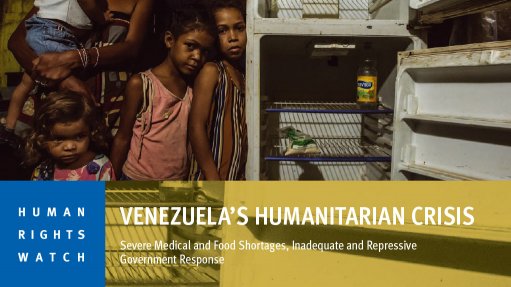
Venezuela is experiencing a profound humanitarian crisis. Severe shortages of medicines and medical supplies make it extremely difficult for many Venezuelans to obtain essential medical care. And severe shortages of food and other goods make it difficult for many people to obtain adequate nutrition and cover their families’ basic needs.
The Venezuelan government’s response to date has been woefully inadequate. Authorities deny the existence of a crisis. They have not articulated or implemented effective policies to alleviate it on their own, and have made only limited efforts to obtain international humanitarian assistance that could significantly bolster their own limited efforts.
While the government continues to argue that the crisis does not exist, Venezuelans’ rights to health and food continue to be seriously undermined, with no end in sight. As UN High Commissioner for Human Rights Prince Zeid Ra’ad Al Hussein put it in September 2016, Venezuela has suffered a “dramatic decline in enjoyment of economic and social rights, with increasingly widespread hunger and sharply deteriorating health-care.”
Human Rights Watch examined the scope and impact of this crisis through field research in six states and the capital, Caracas, in June 2016, and subsequent interviews via telephone and other media. We visited public hospitals, as well as locations where people were lined up to purchase goods subject to price controls set by the government. We interviewed more than 100 people, including health care providers, people seeking medical care or food subject to price controls, people who had been detained in connection with protests linked to the shortages, human rights defenders, and public health experts.
We found that the shortages, which have increased over the past two years, are taking a heavy toll on the well-being of many Venezuelans. Our findings are consistent with those of professional organizations from the health sector, academics who have conducted surveys on the extent and impact of food scarcity, and local non-governmental groups. Internal reports from the Venezuelan Health Ministry reviewed by Human Rights Watch include rates of infant and maternal mortality in 2016 that are substantially higher than the rates reported in previous years. According to health professionals interviewed by Human Rights Watch, unhygienic conditions and medical shortages in hospital delivery wards are important contributing factors to the sharp rise in infant and maternal mortality rates.
Report by the Human Rights Watch